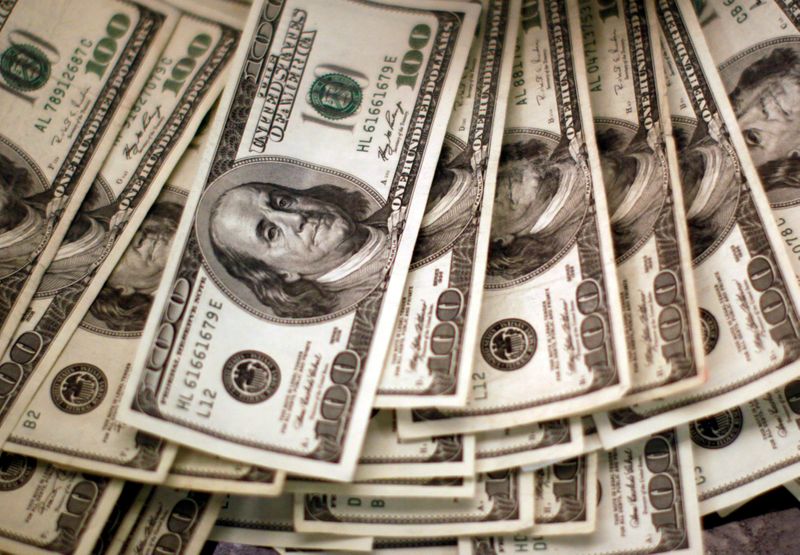By Vuyani Ndaba, Vivek Mishra and Gabriel Burin
JOHANNESBURG/BENGALURU/BUENOS AIRES (Reuters) - Hobbled emerging market currencies will struggle over the next three months against the stronger dollar as tensions between the United States and China over the coronavirus pandemic mount, a Reuters poll of FX strategists showed.
Just as traders were cosying up to unprecedented aggressive policy easing and some investors were a little more ready to enter risky bets in search of higher yields, U.S. President Donald Trump threatened Beijing with new tariffs.
That has reminded many of the allure of safe havens and underpinned the dollar, even following a dizzying 30% run-up for Wall Street over the past several weeks after an initial fall of more than a third as the virus became a full-blown pandemic.
"This is likely to put a serious dent in the head-scratching, math-defying risk-on rally we have seen for much of the week," said Michael Every, global strategist at Rabobank in Hong Kong.
Indeed, 22 of 56 market strategists and analysts polled May 4-6 said currencies from key emerging markets - most of which export raw materials to China - are at risk of modestly weakening in next three months as safe havens remain popular. Sixteen said they would hover around current levels.
Graphic - Outlook for emerging market currencies over the next three months: https://fingfx.thomsonreuters.com/gfx/polling/gjnpwejdapw/Emerging%20market.PNG
Many poll respondents said there would be higher FX volatility ahead.
Most emerging market currencies have stabilized after falling to three-year lows at the end of March, one of the worst months on record, with a 3.5% loss. They are down about 6% as a whole since the start of 2020, according to an MSCI (NYSE:MSCI) index (MIEM00000CUS).
Even though the pandemic has subsided in China for now, a possible resumption of the U.S.-China trade war will nudge Beijing's authorities to keep a tight leash on its partly managed yuan currency, the poll suggested.
After weakening to a one-month low on Wednesday, the most actively traded emerging market currency is forecast at 7.05 per dollar in three months, around where it was on Wednesday, strengthening to 7.01 in six months.
The yuan is then forecast to appreciate about 2% to 6.95 per dollar by this time next year.
But Rabobank's Every, like some other analysts, said the investor optimism that has built up in recent weeks seemed premature.
"The key thresholds to watch are 7.15, which was the high seen this year, and then 7.19, which was the high seen before the 'Phase 1 trade deal' was signed," he said.
"Break through the latter and we are in a dark and scary tunnel...and we don't know if the light we see ahead is a way out or just the reflection of a monster's eye."
The battered Indian rupee is not expected to recoup its recent losses over the coming year but is predicted to gain about 2% from 75.88 per dollar it was trading at on Wednesday.
South Africa's rand
"Investors do sometimes use low-yield emerging market currencies as a defensive strategy, but then when risk appetite improves, they will likely go for the likes of South Africa where yields are highest in nominal terms and real terms," said Absa Capital currency strategist Mike Keenan in Johannesburg.
"Volatility is still high from the peaks of last month. It will only subside further if we get a bit more improvement in the COVID situation and (so long as) any kind of tensions between the U.S. and China don't flare up," Keenan added.
The slower spread of coronavirus in some countries had lifted risk sentiment, with New Zealand recording no new cases for a second day in a row this week and Germany, Finland and New York State planning to ease lockdown restrictions.
Many emerging market central banks like those in South Africa, Brazil and India have also been pumping out monetary stimulus to shore up liquidity in their domestic markets, although nothing close to the size of the U.S. Federal Reserve's interventions and dollar swap lines.
Coronavirus infections have either peaked or slowed down in the developed world, but an inflection point has yet to be reached in many emerging markets - a huge area of concern as health facilities aren't anywhere near as prepared or well-funded.

Indigenous leaders in Brazil, for example, asked the World Health Organization on Monday to set up an emergency fund to help protect their communities from the threat of the pandemic.
(Polling by Khushboo Mittal, Sujith Pai and Indradip Ghosh; Editing by Ross Finley and Hugh Lawson)
